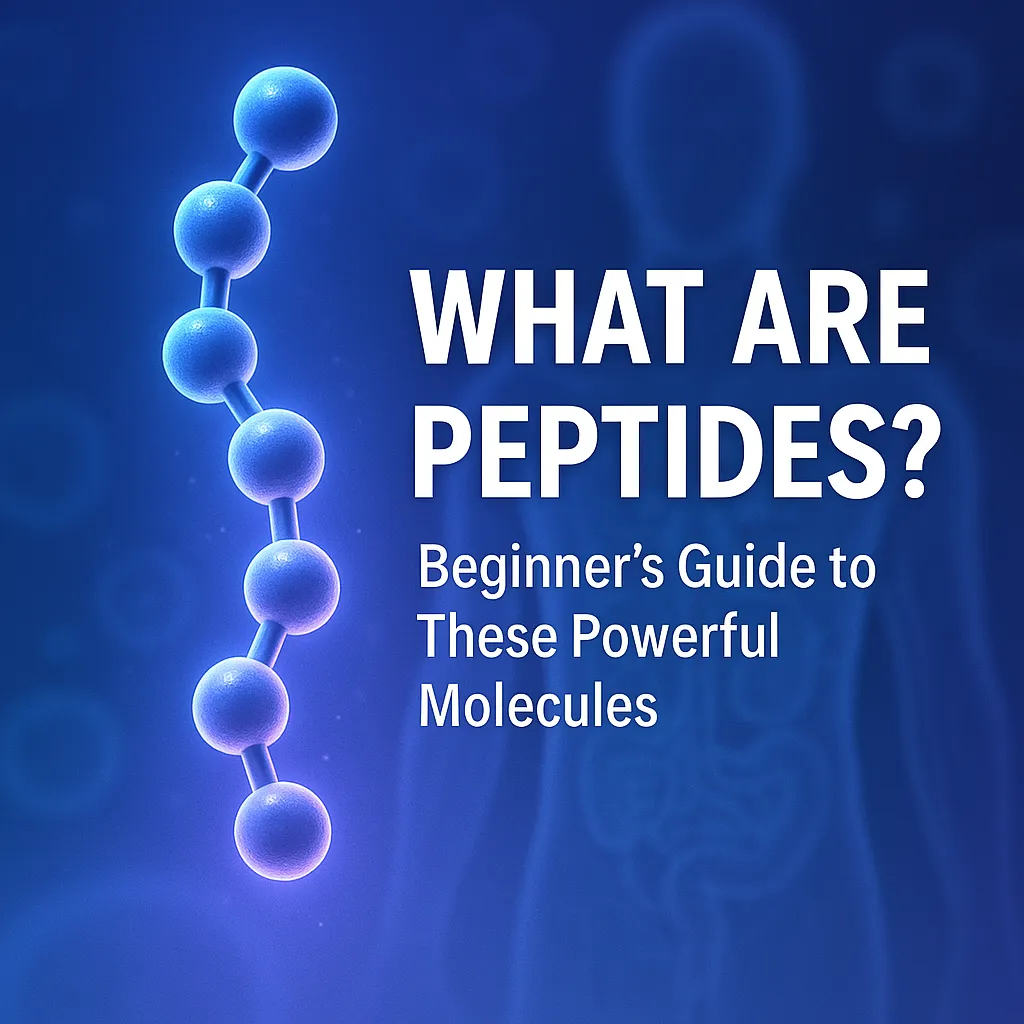
What Are Peptides and How Do They Work?
A Beginner’s Guide to These Powerful Molecules
Peptides have become one of the most talked-about tools in health, healing, and performance — but what exactly are they?
TL;DR: Peptides are short chains of amino acids that signal your body to perform specific biological functions like healing, reducing inflammation, or burning fat. Your body makes them naturally, and researchers are now exploring how synthetic peptides may enhance recovery, performance, and longevity.
Whether you're dealing with nagging injuries, slow recovery, or looking to optimize your health, peptides might be worth learning about. This guide will walk you through everything you need to know — in plain English.
What Exactly Are Peptides?
At a basic level, peptides are small proteins — chains of amino acids that your body uses to send signals.
If proteins are like long novels made of amino acids, peptides are more like short text messages.
They’re quicker, more targeted, and act as biological messengers. One famous example is insulin, which is a naturally occurring peptide that regulates blood sugar.
Peptides are short chains of amino acids that act as messengers in the body, telling cells to perform specific functions like healing tissue, producing hormones, or reducing inflammation.
How Do Peptides Work in the Body?
Peptides interact with your body by binding to receptors on the surface of cells. Once a peptide “locks in,” it triggers a specific response inside the cell — such as:
Releasing growth hormone
Triggering collagen production
Speeding up blood vessel repair
Reducing systemic inflammation
🧠 Think of peptides like text messages: your body sends them to tell certain systems to take action. What makes them so interesting is their precision — instead of flooding your system, they target specific tissues or processes.
What Are Peptides Used For?
Researchers — and a growing number of athletes and health enthusiasts — are exploring peptides for:
💪 Injury recovery (muscle, tendon, ligament)
🔥 Reducing inflammation
🧠 Cognitive function and neuroprotection
🛌 Improved sleep
🧬 Anti-aging and longevity
💊 Gut healing and immune support
🧽 Tissue regeneration
🏋️ Muscle growth and fat loss
Peptides aren’t a magic bullet, but they are one of the most promising tools in the performance and recovery toolkit.
Are Peptides Natural or Synthetic?
Many peptides are bioidentical, meaning they’re chemically identical to the ones your body already produces. Others are synthetic, designed to be more stable or last longer in the body.
Because they're not classified as prescription drugs (in most cases), they’re often sold as “research chemicals” — which leads to some gray areas legally (more on that below).
Are Peptides Safe? What Does the Science Say?
While many peptides show exciting results in lab and animal studies, most are still in the research phase and not FDA-approved for human use.
However, that doesn’t mean they’re unsafe — it just means they haven’t gone through the FDA approval process. Safety depends on:
The quality and purity of the product
Proper dosing and use
Individual response
⚠️ Always source peptides from a trusted supplier with third-party lab testing — impurities or contamination are the real risk.
See our top-rated peptide brands for 2025 →
What Are the Most Popular Peptides in 2025?

How Are Peptides Taken?
Most peptides come as lyophilized powder (freeze-dried) and must be reconstituted with bacteriostatic water.
Delivery methods include:
💉 Subcutaneous injection (most common)
💊 Oral capsules (low absorption for most)
👃 Nasal sprays
💧 Topical creams (for skin-specific peptides)
📌 Note: Improper handling can destroy peptide structure — refrigeration is key.
Are Peptides Legal?
Peptides like BPC-157 and TB-500 are legal to purchase for research purposes in many countries, including the U.S.
However:
They are not approved for human use by the FDA
They cannot be marketed as treatments or cures
Selling them as dietary supplements or making health claims is prohibited
That’s why reputable sellers list them as “research only.”
Final Thoughts: Should You Try Peptides?
Peptides represent a fascinating and fast-evolving area of health science. If you're looking for tools that may support healing, performance, or longevity — they’re worth researching.
But they’re not risk-free. You should:
Do your homework
Use trusted sources
Understand they’re experimental
For many, peptides are the missing link between passive recovery and active regeneration.
Want to Go Deeper?
📖 Grab the Book
Learn everything in one place. The Complete Beginner's Guide to Peptides breaks down the science, the strategies, and the smart way to experiment safely.
Frequently Asked Questions
Are peptides legal to buy online?
Yes, in the U.S. peptides like BPC-157 can be purchased for research use, but not for human consumption.
Do peptides really work?
Research shows promising results for healing, inflammation, and regeneration, especially in animal studies. Human research is ongoing.
What are the side effects of peptides?
Side effects vary by peptide and include injection site reactions, dizziness, or headaches in rare cases.
What peptides help with recovery?
BPC-157, TB-500, and GHK-Cu are most commonly explored for injury and soft tissue recovery.
